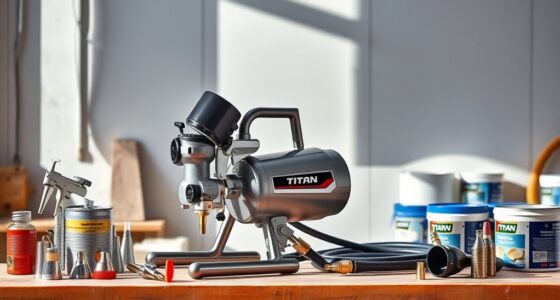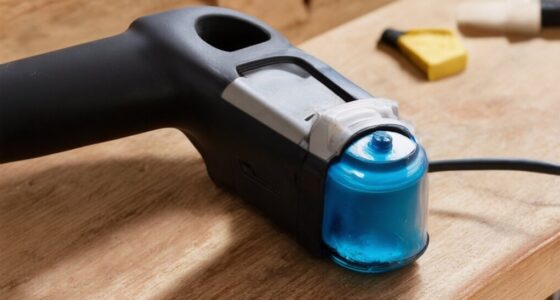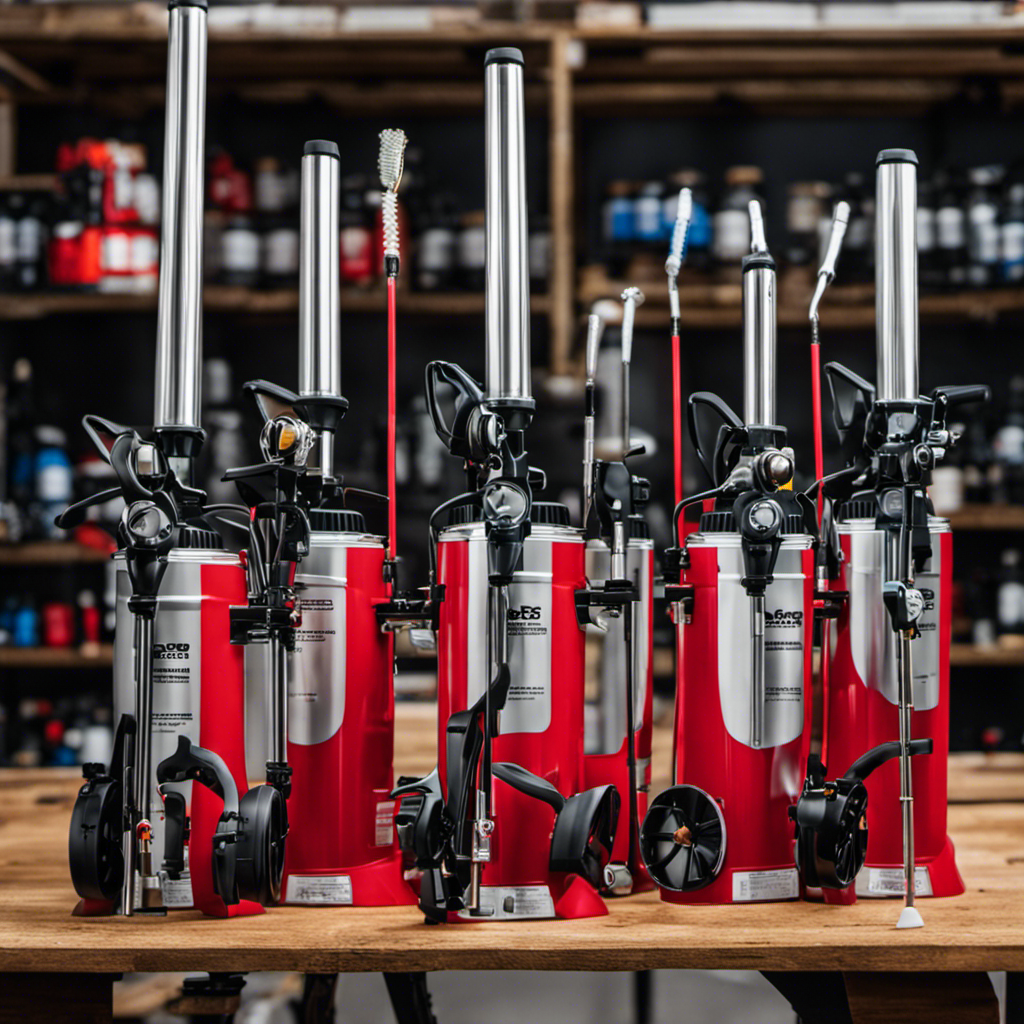If you’re looking for the best premium NAS storage solutions for 2025, I recommend considering options like high-performance desktops such as the UGREEN NASync DXP8800 Plus, which offers fast speeds and large capacities. For reliable internal drives, the Seagate IronWolf Pro 14TB is a top choice. DIY enthusiasts might prefer the Geekworm NASPi V2.0 for customization. Compact, durable enclosures, enterprise drives, and personal cloud devices also make great options. Keep an eye out for these choices—they’ll help streamline your data management and storage needs.
Key Takeaways
- Highlight top-tier NAS models with high capacity, fast data transfer speeds, and advanced security features for professional use in 2025.
- Include enterprise-grade solutions like UGREEN NASync DXP8800 Plus for high responsiveness and robust data management.
- Cover premium storage enclosures and SSD upgrades that enhance NAS performance and scalability.
- Emphasize durable, high-quality NAS cases and racks designed for demanding environments and efficient organization.
- Consider features such as RAID support, multi-user performance, and compatibility with latest hardware standards for seamless data handling.
BUFFALO LinkStation 210 2TB NAS Storage Device
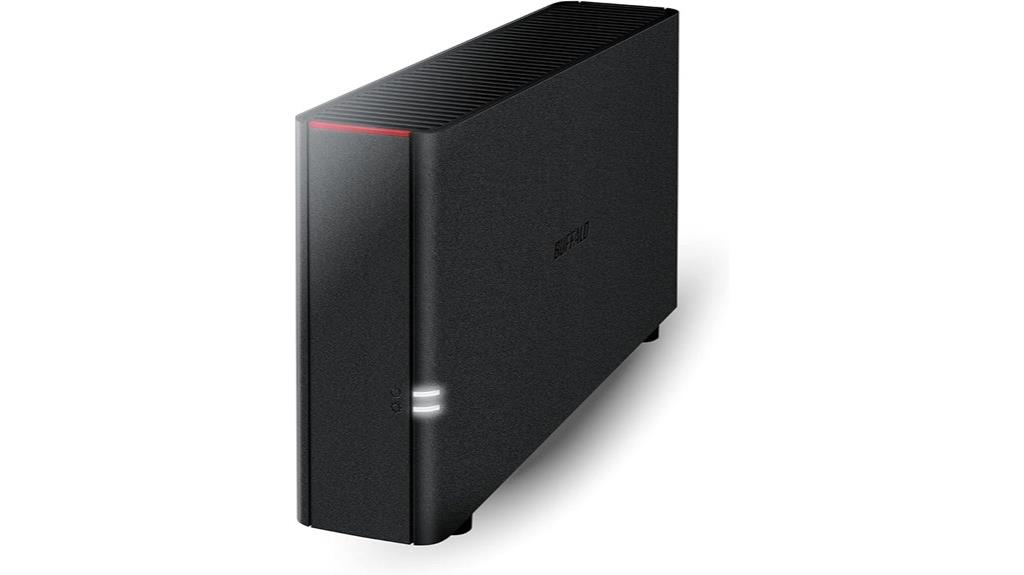
If you’re looking for an affordable, easy-to-set-up NAS solution for personal or small home use, the BUFFALO LinkStation 210 2TB is a solid choice. It offers centralized storage, backup, and personal cloud capabilities with simple setup and management. Compatible with Windows and MacOS, it connects via your router for shared access across devices. With 2TB of storage, RAID support for data redundancy, and SSL encryption for security, it’s designed to safeguard your files. The device features a straightforward web interface, external USB port, and quick setup, making it ideal for users seeking reliable, budget-friendly network storage.
Best For: budget-conscious individuals or small households seeking an easy-to-use, reliable network-attached storage solution for personal files and backups.
Pros:
- Affordable price point with basic NAS features suitable for home use
- Easy setup with a simple web interface and quick installation process
- Compatible with both Windows and MacOS, supporting centralized storage and backups
Cons:
- Slow data transfer speeds over LAN, which may hinder large file transfers
- Limited utility options and features compared to higher-end NAS devices
- Reports of hardware failures and inconsistent customer support can affect reliability
Geekworm NASPi V2.0 SATA HDD/SSD NAS Storage Kit for Raspberry Pi 4
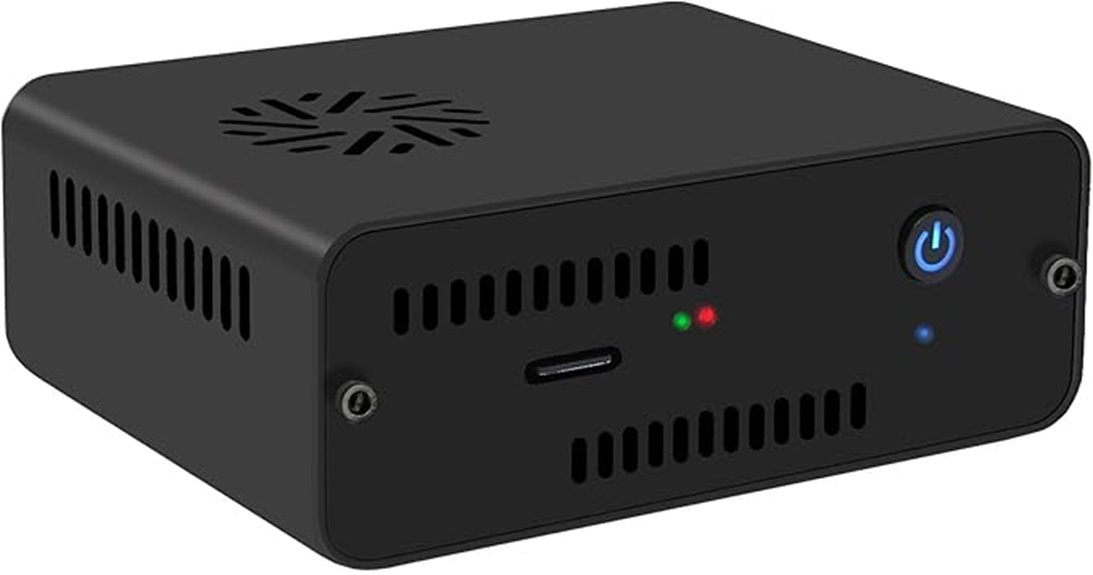
Looking to transform your Raspberry Pi 4 into a powerful home NAS or media server? The Geekworm NASPi V2.0 makes it easy with a sleek, all-in-one SATA HDD/SSD storage kit. It includes a sturdy aluminum case, a storage shield, and an adapter board, supporting 2.5-inch drives up to 9.8mm thick. The kit features an efficient cooling system with a PWM fan and auto power on, making setup straightforward. Powered via a reliable Type-C port with a recommended 5V 4A adapter, it’s perfect for creating a compact, yet versatile, NAS or media center tailored for seamless data management.
Best For: enthusiasts and DIYers looking to build a compact, efficient home NAS or media server using Raspberry Pi 4 with easy installation and reliable cooling.
Pros:
- Supports 2.5-inch SATA SSDs/HDDs up to 9.8mm thick for broad compatibility
- Includes a comprehensive cooling system with PWM fan and aluminum case for optimal heat dissipation
- Features auto power on and simple power management buttons for convenient operation
Cons:
- Requires a 5V 4A power supply, which may necessitate purchasing separately if not already available
- Limited to 2.5-inch drives, not compatible with larger 3.5-inch HDDs
- Setup involves installing shell scripts for certain functions, which might be complex for beginners
UGREEN NASync DXP8800 Plus 8-Bay Desktop NAS
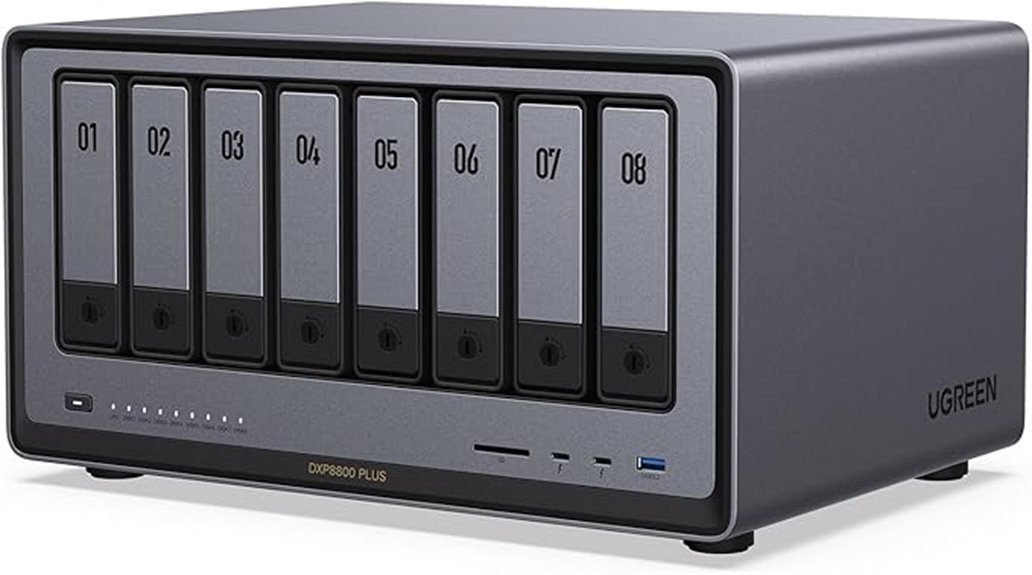
The UGREEN NASync DXP8800 Plus 8-Bay Desktop NAS stands out as an excellent choice for prosumers and small businesses seeking powerful, flexible storage. Its Intel 12th Gen i5 processor, 8GB DDR5 RAM, and 128GB SSD deliver impressive speed and responsiveness. Supporting up to 256TB with RAID options, it offers versatile data management. Dual 10GbE ports enable up to 2500MB/s transfer speeds, perfect for large file transfers and media streaming. Running UGOS Pro, it guarantees security with encryption and multi-factor authentication. Built with quality materials and upgrade options, it’s a reliable, high-performance solution for demanding workloads and seamless data management in 2025.
Best For: prosumers and small businesses seeking a high-performance, flexible NAS solution for media streaming, backups, and demanding workloads.
Pros:
- Powerful hardware with Intel 12th Gen i5 processor and expandable DDR5 RAM for smooth multitasking
- Fast transfer speeds up to 2500MB/s with dual 10GbE ports, ideal for large file transfers and streaming
- Versatile storage options supporting RAID levels and third-party drives for customized data management
Cons:
- Not designed for enterprise-scale workloads or large-scale data centers
- Heat and noise from enterprise-grade drives can require additional cooling solutions
- Slightly complex setup and management may require some technical familiarity for optimal use
Seagate IronWolf Pro 14TB NAS Internal Hard Drive

For those building a high-capacity NAS that demands reliability and performance, the Seagate IronWolf Pro 14TB NAS Internal Hard Drive stands out as a top choice. Designed for multi-user environments, it offers 14TB of storage, speeds up to 250MB/s, and a 7200 RPM rotational speed. Built with NAS-optimized AgileArray firmware, it guarantees RAID reliability and compatibility under heavy workloads. The drive features vibration sensors for consistent performance, low noise, and durability with a 300TB/year workload rate and 1.2 million hours MTBF. With a five-year warranty and Rescue Data Recovery Services, it provides peace of mind for demanding, 24/7 NAS applications.
Best For: users building high-capacity, multi-user NAS systems who prioritize reliability, durability, and robust data protection.
Pros:
- High storage capacity of 14TB suitable for demanding NAS environments
- Designed for continuous 24/7 operation with a 5-year warranty and Rescue Data Recovery Services
- NAS-optimized AgileArray firmware ensures RAID reliability and compatibility under heavy workloads
Cons:
- Higher cost per TB compared to smaller capacity drives
- Some users report early failures and concerns about quality control for larger capacities
- Slightly noisy during startup or random read operations, which may affect silent operation preferences
Premium 4-Bay SSD HDD Storage Enclosure

If you’re a professional seeking a robust storage expansion, the Premium 4-Bay SSD HDD Storage Enclosure stands out with its heavy-duty construction and support for multiple drive configurations. Designed for 3.5-inch drives, it can house four HDDs or SSDs with adapters, making it versatile for various setups. Its durable build and compatibility with different power and data interfaces guarantee reliable performance. Although unfinished, it’s ideal for users comfortable with assembly and customization. With space for fan mounting and spare parts included, it’s a solid choice for expanding storage capacity in demanding environments, especially when paired with the right accessories and cooling solutions.
Best For: professional users seeking a heavy-duty, customizable storage enclosure for expanding capacity with multiple drives.
Pros:
- Supports four 3.5-inch drives or SSDs with adapters, offering versatile storage options.
- Heavy-duty construction ensures durability and robustness suitable for demanding environments.
- Compatible with various power and data interfaces, including 4-pin, 15-pin, and 7-pin connectors.
Cons:
- Unfinished design may require additional modifications or components for full functionality.
- No included fan or electronics, so additional cooling solutions are needed for optimal performance.
- Slightly bulky size (166x146x128mm) might limit portability or space-constrained setups.
G500 2.5 SATA SSD 2TB
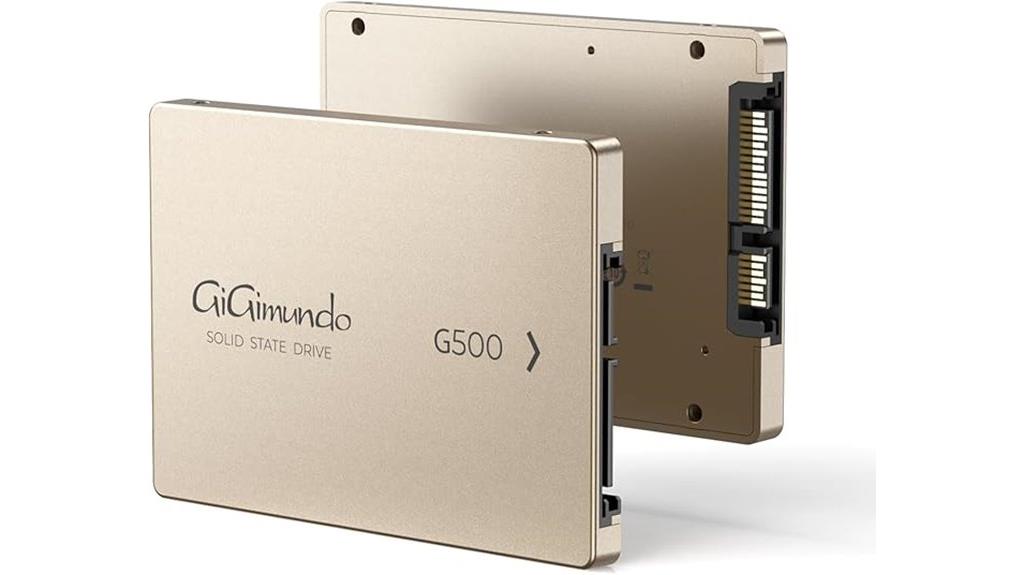
Looking for a reliable upgrade that delivers lightning-fast speeds for your NAS setup? The G500 2.5 SATA SSD 2TB is exactly what you need. It supports SATA 3.0, offering read speeds up to 6 Gbps, which means quicker file transfers and snappier app loads. Its durable aluminum housing ensures shock resistance and heat dissipation, making it perfect for heavy use. Compatibility is broad—fits laptops, desktops, and gaming consoles like PS4 and Xbox Series X. Installation is simple—just format, connect, and go. Plus, it’s power-efficient and available in multiple capacities, providing reliable, fast storage for any data management task.
Best For: users seeking a high-performance, reliable SSD upgrade for NAS devices, gaming consoles, or desktop and laptop computers needing fast data transfer speeds.
Pros:
- Supports SATA 3.0 protocol with read speeds up to 6 Gbps for quick file transfers and app loading
- Durable aluminum alloy housing provides shock resistance, heat dissipation, and electromagnetic shielding
- Broad compatibility with laptops, desktops, PS4, Xbox Series X, and other devices, with easy installation
Cons:
- Limited to SATA interface; lacks NVMe or PCIe speed advantages
- May be more costly compared to traditional HDDs with similar capacity
- Requires formatting and setup before use, which could be a hurdle for complete beginners
SilverStone CS01-HS Mini-ITX NAS Case with Aluminum Exterior
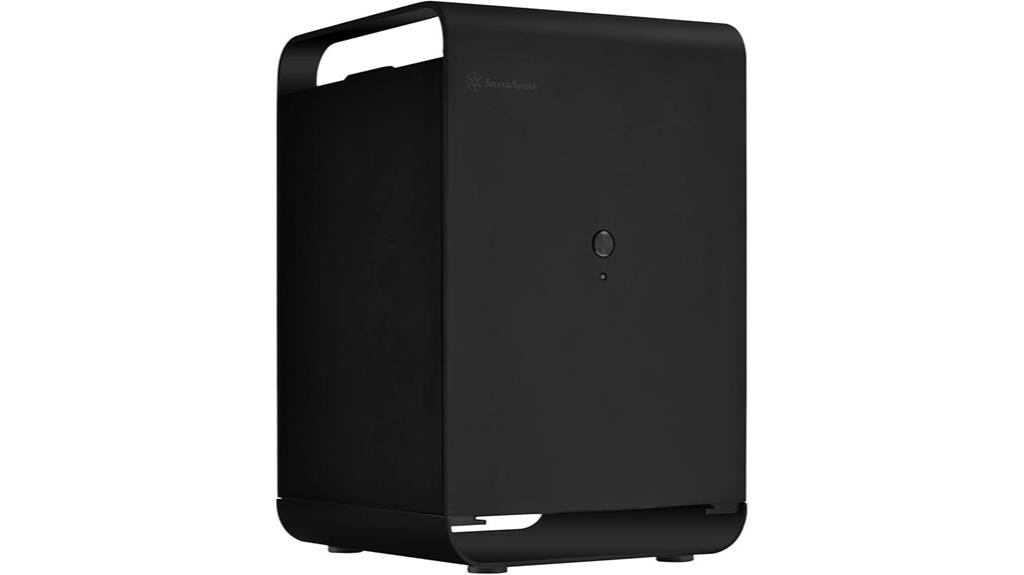
The SilverStone CS01-HS Mini-ITX NAS case stands out with its sleek aluminum exterior and innovative 90-degree rotated design, making it ideal for users seeking efficient thermal management and quiet operation. Its modern, durable anodized aluminum finish complements any office or home setup, while its vertical layout ensures ideal airflow through stack effect cooling. With six hot-swappable 2.5-inch drive bays, expandable to eight, it offers flexible storage options for NAS and server builds. The built-in Air Penetrator fan enhances cooling, reducing noise during continuous operation. Compact yet sturdy, it supports high-speed SATA and SAS drives, making it a top choice for seamless data management.
Best For: users seeking a durable, stylish, and thermally efficient mini-ITX NAS case for home or office storage solutions.
Pros:
- Sleek anodized aluminum exterior offers durability and modern aesthetics
- Innovative 90-degree rotated design enhances airflow and cooling efficiency
- Supports hot-swappable 2.5-inch drives, expandable to eight for flexible storage
Cons:
- Weighs approximately 12 pounds, which may be heavy for portable setups
- Limited to mini-ITX motherboards, restricting compatibility with larger components
- Price may be higher compared to plastic or less premium cases with similar features
JONSBO N2 White NAS ITX Case with 5+1 Disk Bays

For home users or small-scale businesses seeking a compact, reliable NAS server, the JONSBO N2 White NAS ITX Case stands out due to its efficient use of space and versatile storage capacity. Its aluminum mini chassis measures just 8.86 inches square and 8.82 inches high, making it ideal for tight setups. It supports five 3.5” HDDs and one 2.5” SSD, offering ample storage options. The case includes a built-in 12cm fan for cooling, plus front panel ports—USB-C, USB 3.0, and audio/mic. Designed for easy assembly, it’s compatible with ITX motherboards and low-profile GPUs, providing a flexible, space-efficient solution for data management.
Best For: small home users or small-scale businesses seeking a compact, reliable NAS server with versatile storage and easy setup.
Pros:
- Compact aluminum mini chassis with a sleek white design.
- Supports up to 6 disks, including 5 HDDs and 1 SSD, for ample storage.
- Features built-in cooling and versatile front panel connectivity options.
Cons:
- Limited to ITX motherboards and low-profile GPUs, which may restrict upgrade options.
- Power supply size limited to maximum 150mm, potentially limiting PSU choices.
- Lacks dedicated hot-swappable drive bays, requiring manual installation/removal of disks.
1U Sliding Rack Shelf for 19-Inch Server Racks
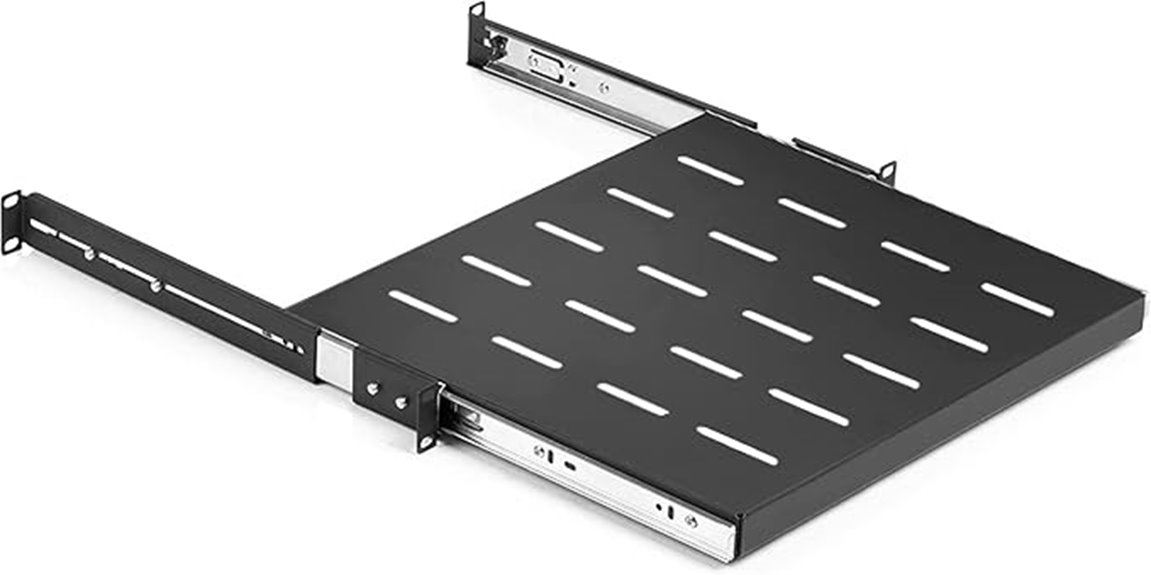
A 1U Sliding Rack Shelf for 19-inch server racks offers a versatile solution for professionals who need easy access to their equipment. I find it ideal for supporting non-rack mountable gear like mixers, media devices, or servers, thanks to its adjustable depth from 14 to 22 inches. Made from durable, rust-resistant cold-rolled steel, it supports up to 60 pounds and features vented slots for airflow. The smooth sliding mechanism makes maintenance simple, while its compatibility with standard racks ensures easy installation. Although some users report fit issues with certain rack sizes, overall, it provides a solid, reliable, and customizable option for managing equipment efficiently.
Best For: professionals and hobbyists needing adjustable, durable shelving for server racks, media equipment, or non-rack mountable gear.
Pros:
- Adjustable depth from 14 to 22 inches for versatile fitment.
- Made of sturdy, rust-resistant cold-rolled steel supporting up to 60 pounds.
- Smooth sliding mechanism for easy access and maintenance.
Cons:
- Some users experience fit issues with certain rack sizes or configurations.
- May require modifications, such as enlarging holes, for perfect customization.
- Slightly heavier weight may affect stability with very heavy equipment.
Tecmojo 12U Network Rack with Translucent Panels and Handles
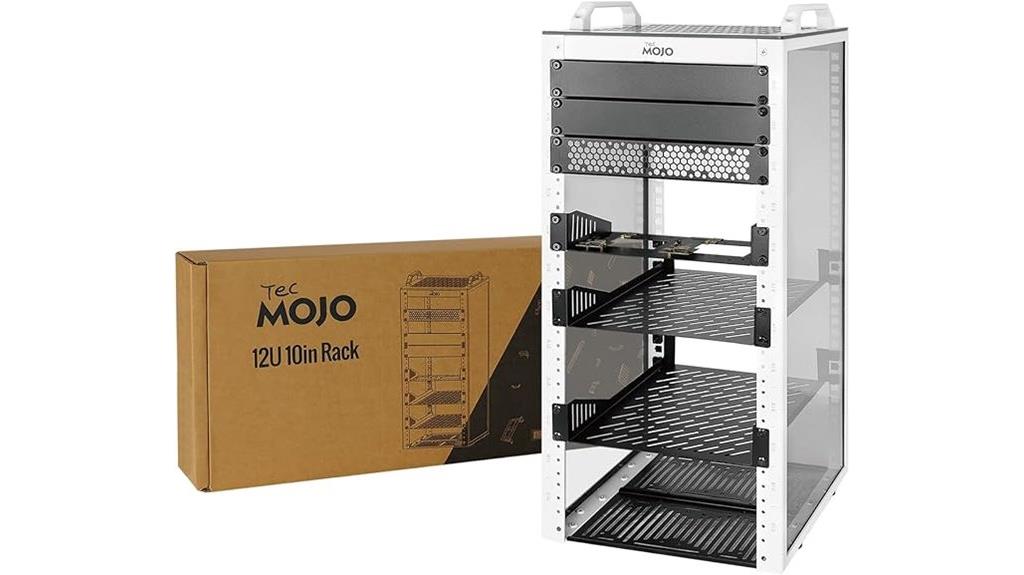
If you’re looking for a compact yet sturdy solution to organize your NAS and networking gear, the Tecmojo 12U Network Rack with Translucent Panels and Handles stands out. It measures just over 10 inches deep, 10 inches wide, and 11 inches high, supporting up to 12U of equipment. Made from durable cold-rolled steel with acrylic side panels, it offers excellent airflow and easy device monitoring. The open-frame design handles up to 200 lbs, and the included accessories—shelves, blank panels, and mounting hardware—make setup simple. With its sleek white finish and portability handles, it’s perfect for small offices, home labs, or AV setups.
Best For: small offices, home labs, or AV setups seeking a durable, compact, and easy-to-monitor network rack solution.
Pros:
- Supports up to 12U of equipment with a 200 lbs capacity for heavy gear
- Made from high-strength steel with translucent acrylic panels for durability and visibility
- Easy to assemble with included accessories and a sleek, fingerprint-resistant finish
Cons:
- Some users report minor confusion with accessory installation instructions
- Limited depth (just over 10 inches) may restrict larger or bulkier equipment
- Open-frame design offers less physical security compared to enclosed racks
BUFFALO DriveStation Quad 16TB External Hard Drive

The BUFFALO DriveStation Quad 16TB External Hard Drive stands out as an excellent choice for creative professionals and small offices seeking reliable, high-capacity storage with built-in RAID capabilities. It offers 16TB of space, pre-configured in RAID 5 for fault tolerance, making it suitable for backups, server storage, or media editing. Made in Japan and compatible with both PC and Mac (formatting required), it features USB 3.2 Gen 1 for speedy connections. Although some users report speed limitations in RAID 5 mode over USB 2.0, others appreciate its ease of setup, reliability, and the included NAS-grade drives. It’s a versatile, robust storage solution.
Best For: creative professionals, small offices, and users needing reliable high-capacity RAID storage for backups and media editing.
Pros:
- Pre-configured RAID 5 offers fault tolerance and data protection
- Easy to set up and compatible with both PC and Mac (formatting required)
- Includes NAS-grade drives and a 3-year warranty with support
Cons:
- Potential speed limitations over USB 2.0 in RAID 5 mode
- Some users experience drive remounting issues after sleep mode on Windows
- RAID management software could be more user-friendly and flexible
Avolusion PRO-Z 16TB USB 3.0 External Hard Drive
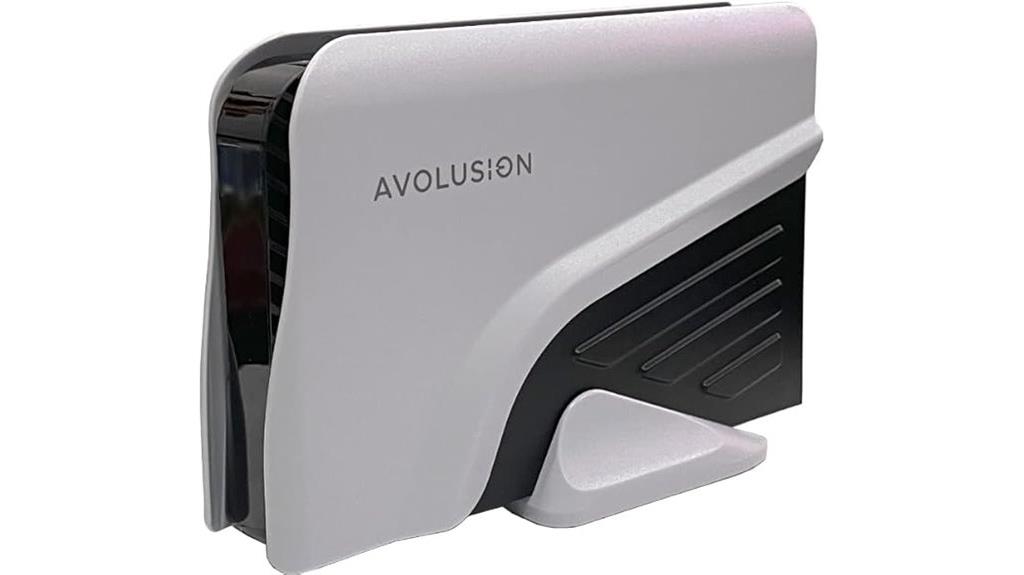
For users seeking a large-capacity external drive that’s easy to set up and compatible with Windows systems, the Avolusion PRO-Z 16TB USB 3.0 External Hard Drive stands out. It offers 16TB of storage, perfect for backing up games, photos, videos, and more. Its plug-and-play USB 3.0 interface delivers speeds up to 5 Gbit/s, ensuring quick data transfers. Designed with a silent, fan-less build and a durable chassis, it’s built for reliable, long-term use. Compatible with Windows 11, 10, 8, and 7, it’s a straightforward, high-capacity solution for expanding your storage effortlessly. However, users should weigh its impressive capacity against mixed reviews on durability.
Best For: users needing a high-capacity, easy-to-use external hard drive for Windows-based systems to back up large files like games, photos, and videos.
Pros:
- Offers a massive 16TB storage capacity ideal for extensive backups and media libraries
- Plug-and-play USB 3.0 interface with transfer speeds up to 5 Gbit/s for quick data access
- Silent, fan-less design with durable construction ensures reliable, long-term use
Cons:
- Mixed reviews regarding durability and potential mechanical failures
- Reports of data loss and hardware issues from some users
- Customer service experiences vary, which may affect post-purchase support
HGST 6TB Internal SAS 7200 RPM Hard Drive

Looking for a reliable, enterprise-grade hard drive that can handle demanding NAS workloads? The HGST 6TB Internal SAS 7200 RPM drive fits the bill perfectly. It features a 3.5-inch form factor, 7200 RPM speed, and a 256 MB buffer, delivering fast, consistent performance. Built with high enterprise reliability, it boasts up to 2.5 million hours MTBF and a 5-year warranty. Designed for heavy workloads, it can handle up to 550 TB annually, making it ideal for data centers and NAS setups. Its quiet, cool operation and extensive compatibility guarantee seamless integration, making it a top choice for demanding, long-term storage solutions.
Best For: enterprise data centers, NAS users, and professionals needing high-capacity, reliable storage for demanding workloads.
Pros:
- High enterprise reliability with up to 2.5 million hours MTBF and 5-year warranty
- Fast performance with speeds exceeding 263 MB/s and 7200 RPM rotational speed
- Extensive compatibility with OEM systems, SAS controllers, and host bus adapters
Cons:
- Limited or no warranty coverage for OEM drives, requiring reliance on seller support
- May lack mounting accessories like screws, requiring additional purchase for installation
- Potential for drive failure if not properly handled or backed up, emphasizing the importance of data redundancy
WD My Book Live 1TB Personal Cloud Storage NAS Share Files and Photos
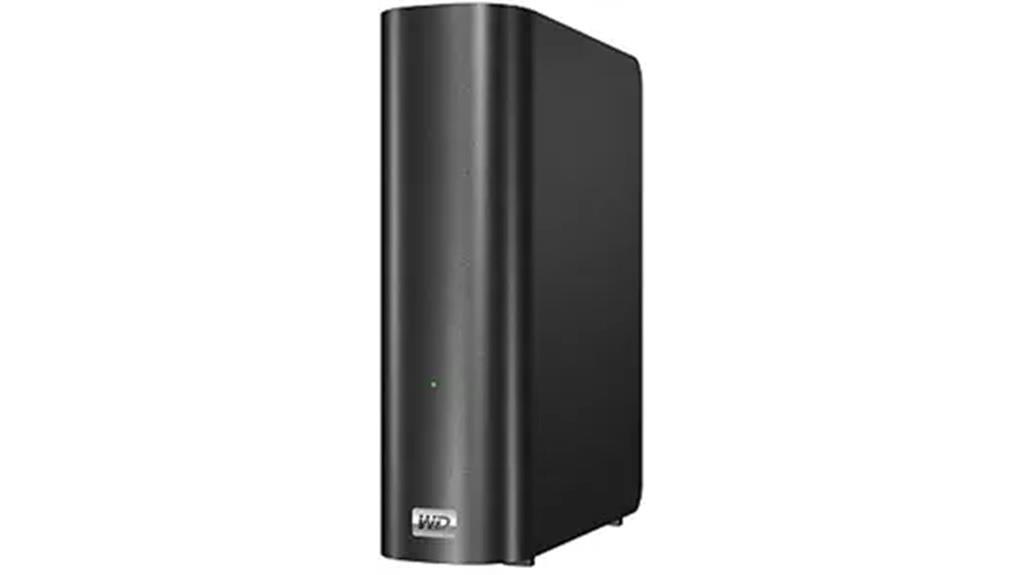
If you’re seeking a straightforward way to store and share personal media and files across multiple devices, the WD My Book Live 1TB Personal Cloud Storage NAS is an excellent choice. It allows you to store and back up movies, music, photos, and important files in one secure location, reducing clutter from USB sticks and disks. With automatic backups via WD SmartWare for Windows and compatibility with Apple Time Machine, Mac users can easily back up wirelessly over WiFi. Simply connect the device to your router, and any PC or Mac on your network can access and share media seamlessly, making digital management simple and reliable.
Best For: Home users and small offices seeking an easy, reliable way to store, back up, and share personal media and files across multiple devices.
Pros:
- Simple setup and network discovery for quick deployment
- Compatible with both Windows and Mac systems for automatic and wireless backups
- Provides ample 1TB storage for movies, music, photos, and important files
Cons:
- Limited to 1TB storage capacity, which may not suit users with large media libraries
- No mention of advanced features such as remote access or cloud integration
- Requires connection to a router, limiting portability and standalone use
Buffalo LinkStation 220 4TB NAS

The Buffalo LinkStation 220 4TB NAS stands out as an ideal choice for small businesses and personal users seeking an affordable, reliable, and easy-to-use storage solution. It features a 4TB mechanical hard drive, a Marvell ARMADA 370 processor, and 256MB DDR3 RAM, supporting Gigabit LAN for fast data transfer. Its simple setup, intuitive interface, and remote access via mobile apps make managing files straightforward. Designed with active cooling and RAID support, it it guarantees data security and redundancy. While transfer speeds are modest at around 7MB/s, its quiet operation, compact design, and seamless backup options make it a versatile, dependable option for everyday storage needs.
Best For: small businesses and personal users seeking an affordable, reliable, and easy-to-manage network storage solution with basic backup and media streaming capabilities.
Pros:
- User-friendly setup and intuitive interface, ideal for beginners
- Supports RAID configurations for data redundancy and security
- Quiet operation and compact design suitable for home or small office environments
Cons:
- Transfer speeds around 7MB/s may be insufficient for high-speed media streaming or large file transfers
- Higher cost and limited availability of Buffalo-specific disks can increase overall expenses
- Setup for RAID and disk replacement requires careful attention to avoid data loss
Factors to Consider When Choosing Premium NAS Storage Solutions

When selecting a premium NAS solution, I focus on several key factors. These include evaluating my storage capacity needs, ensuring robust data security features, and considering the device’s performance and speed. Additionally, I look at drive compatibility options and the types of network connectivity available to match my specific requirements.
Storage Capacity Needs
Choosing the right NAS storage capacity begins with understanding both your current data needs and how those needs will evolve. I evaluate what types of data I’ll store—whether multimedia files, backups, or large databases—as each influences the required capacity. It’s vital to take into account my data growth rate to guarantee the NAS can be expanded or upgraded over time without hassle. I also review the maximum supported capacity of the device, including drive bay limits and RAID options, to meet my storage volume goals. Balancing capacity with performance is essential; larger setups may need faster drives or more powerful hardware to maintain quick data access. By carefully assessing these factors, I can select a NAS that scales with my needs and delivers reliable, seamless data management.
Data Security Features
To guarantee my sensitive data stays protected, I focus on premium NAS storage solutions that offer advanced security features. These include SSL encryption and multi-factor authentication, which add layers of protection against unauthorized access. Configurable user access restrictions and folder permissions ensure that only authorized individuals can view or modify specific data, maintaining privacy within my network. Built-in security protocols like AES encryption for data at rest help safeguard stored files from theft or breaches. I also prioritize systems that receive regular firmware updates and security patches, addressing vulnerabilities proactively. Additionally, intrusion detection and monitoring tools alert me to potential threats or suspicious activities, enabling swift responses. These features collectively create a robust security environment essential for managing sensitive data confidently.
Performance and Speed
Performance and speed are essential factors I consider because they directly affect how quickly I can access and transfer my data. I look at data transfer speeds, which can range from 8 MB/s to over 2500 MB/s, depending on hardware. The type of drives matters; SSDs deliver much faster read/write times compared to HDDs. Network interfaces like Gigabit Ethernet or 10GbE play a pivotal role in how swiftly data moves between the NAS and my devices. RAID configurations also influence performance—RAID 0 offers speed boosts but less redundancy, while RAID 5 or 6 balance speed with data protection. Ultimately, CPU power and memory capacity impact overall responsiveness, especially during multi-user access or intensive tasks. These factors guarantee my NAS remains fast, reliable, and efficient.
Drive Compatibility Options
How do you guarantee your NAS will support your desired drives? First, check that it supports the right form factor—2.5-inch or 3.5-inch SATA or NVMe drives—matching your needs. Determine if the device allows third-party drives or if it’s limited to proprietary options, as this impacts cost and flexibility. Verify the maximum drive capacity and number of bays to ensure it meets your storage and expansion plans. Also, confirm compatibility with drive interfaces like SATA, SAS, or NVMe, depending on your performance requirements. Finally, look for hardware or software features that make installing drives, hot-swapping, and setting up RAID straightforward. These factors ensure your NAS remains adaptable, reliable, and aligned with your storage goals.
Network Connectivity Types
Selecting the right network connectivity type for your NAS is essential for ensuring fast, reliable data transfer. Ethernet options like Gigabit, 10GbE, or higher provide stable and high-speed connections fundamental for demanding applications. Wired connections generally outperform Wi-Fi in speed and reliability, making them preferable for data-intensive tasks. Supporting multiple Ethernet ports and link aggregation can boost bandwidth and add redundancy, improving network performance and uptime. Compatibility with your existing network infrastructure, including switches and routers, is critical for seamless integration. As data demands grow, future-proof NAS solutions that support emerging standards like 10GbE or higher will better accommodate increasing transfer speeds. Choosing the appropriate connectivity type ensures your NAS operates efficiently and meets your current and future data management needs.
Expandability and Upgrades
To guarantee your NAS remains capable of handling growing data demands, you need to prioritize expandability and upgrade options. A flexible system allows you to add drives or upgrade existing storage, ensuring future-proofing as your needs evolve. Support for multiple RAID configurations, like RAID 0, 1, 5, 6, or 10, helps balance redundancy and performance. Compatibility with different drive sizes and types, including SATA and NVMe, maximizes capacity and speed. Modular designs with hot-swappable drive bays enable quick upgrades and maintenance without system downtime. Additionally, upgradable RAM and processors can boost performance and support advanced features like virtualization or intensive data processing. Prioritizing these expandability features ensures your NAS adapts seamlessly to your growing data management needs.
Power Consumption Efficiency
When choosing a premium NAS storage solution, considering power consumption efficiency is essential for reducing energy costs and environmental impact. I look for devices with low-power processors and components designed to minimize power draw during both idle and active states. Power consumption rates, usually specified in watts, give a clear idea of efficiency—lower wattage means less energy use over time. Features like automatic drive spin-down and sleep modes help cut energy consumption when the NAS isn’t in use. Additionally, selecting models with efficient power supplies and good thermal management can markedly lower overall costs and environmental footprint. Monitoring tools that track real-time power usage are also valuable, allowing me to optimize settings without sacrificing performance. These factors ensure energy-efficient, sustainable data management.
Budget and Cost Considerations
Premium NAS storage solutions come in a wide range of prices, with high-capacity, feature-rich models often costing several thousand dollars. When choosing, I recommend balancing initial purchase costs with long-term expenses like maintenance, upgrades, and support fees. Cheaper options might save money upfront but could limit performance, scalability, or data redundancy, which could impact your data security and growth plans. Investing in enterprise-grade drives and hardware raises upfront costs but enhances reliability and lifespan. It’s also vital to contemplate the total cost of ownership, including energy use and warranty coverage, to avoid unexpected expenses down the line. Carefully evaluating these factors ensures you select a solution that fits your budget today while supporting your long-term data management needs.
Frequently Asked Questions
How Does NAS Scalability Impact Long-Term Data Management?
NAS scalability is essential for long-term data management because it allows me to expand storage as my needs grow, avoiding costly migrations or disruptions. With scalable solutions, I can add more drives or upgrade components seamlessly, ensuring smooth data access and security over time. This flexibility saves me money and time, making my data management more efficient and future-proof as my storage requirements increase.
What Security Features Are Essential for Enterprise NAS Solutions?
When selecting enterprise NAS solutions, I prioritize security features like robust encryption, multi-factor authentication, and extensive access controls. Regular firmware updates and intrusion detection are also critical to protect sensitive data. I also look for reliable backup and disaster recovery options. These features give me peace of mind, knowing my data is safeguarded against threats while maintaining seamless access and management across my organization.
How Do Different RAID Configurations Affect NAS Performance?
Different RAID configurations markedly impact NAS performance. For example, RAID 0 offers speed benefits by striping data across disks, but lacks redundancy. RAID 5 balances performance and data protection with parity, while RAID 10 combines mirror and striping for both speed and redundancy. I recommend choosing based on your needs—prioritizing speed, data safety, or a mix—since each setup influences data access and recovery times differently.
What Are the Energy Efficiency Considerations for High-Capacity NAS?
Energy efficiency in high-capacity NAS is vital, so I always look for models with power-saving features like variable fan speeds and energy-efficient processors. I also consider drives with low power consumption and features like scheduled spin-downs. Using NAS with energy management tools helps me monitor and optimize power use, reducing costs and environmental impact. Prioritizing these aspects guarantees my storage remains eco-friendly and cost-effective for the long run.
How Does NAS Compatibility Vary Across Different Operating Systems?
NAS compatibility varies across operating systems, and I’ve found that most modern solutions support Windows, macOS, and Linux, but the level of integration can differ. I always check if the NAS offers native apps or protocols like SMB, AFP, or NFS for seamless access. For example, Windows users benefit from SMB, while macOS prefers AFP or SMB, and Linux often relies on NFS. Compatibility is key for smooth data management.
Conclusion
Choosing the right premium NAS storage is like finding a trusted companion for your data journey—reliable, efficient, and ready to grow with you. With options spanning from compact devices to robust multi-bay systems, there’s a solution for every need. Think of your NAS as the sturdy bridge over a busy river—connecting your data safely and seamlessly. Invest wisely, and you’ll enjoy smooth, worry-free data management for years to come.
A seasoned painter with over 15 years in the industry, Mike transitioned from hands-on painting projects to the digital world of paint sprayers. His extensive experience gives him a unique perspective on what users truly need when it comes to painting tools. As the Editor in Chief of Paint Sprayer Zone, Mike ensures that every piece of content not only provides value but also reflects the realities of painting — the challenges, the joys, and the intricate details.



